The beauty of curved walkway design lies in its ability to work harmoniously with existing landscape features, creating organic transitions between different garden zones while maintaining practical functionality. From sweeping gentle curves that meander through flower beds to dramatic serpentine paths that create mystery and discovery, each design approach offers unique advantages for different outdoor settings. Modern homeowners increasingly choose curved pathways because they soften harsh architectural lines, make small spaces appear larger, and create inviting routes that encourage exploration and outdoor enjoyment throughout every season.
1. Natural Stone Curved Pathways
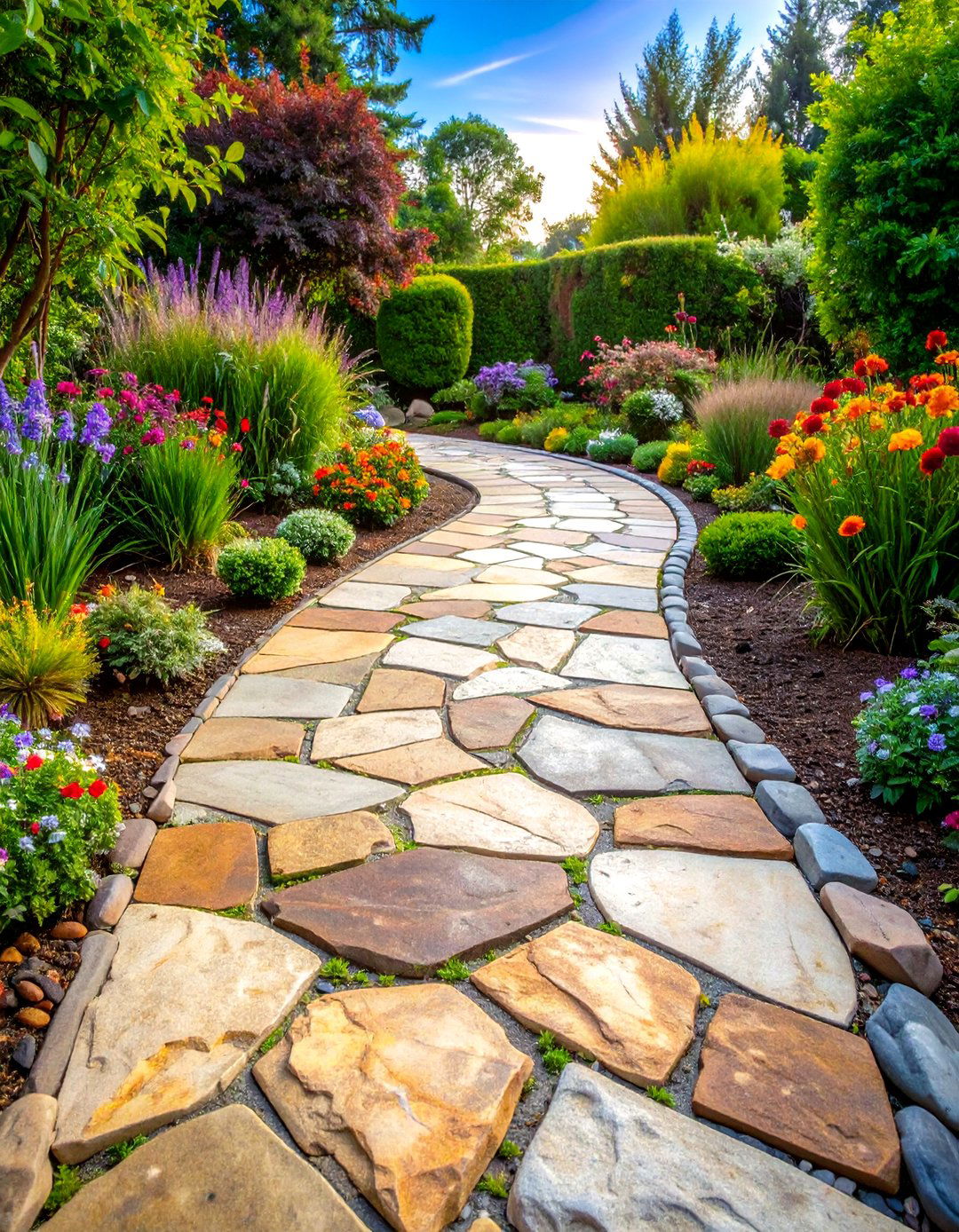
Have you ever wondered how to create a walkway that feels like it belongs in nature? Natural stone curved pathways offer the perfect solution, using irregular flagstone pieces that create organic, flowing routes through gardens and landscapes. These designs work exceptionally well with existing topography, allowing the pathway to follow natural contours while providing stable, durable surfaces for daily use. The varied textures and earth-tone colors of natural stone complement surrounding plantings beautifully, creating seamless transitions between hardscape and softscape elements that enhance the overall garden design.
2. Brick Herringbone Curved Walkways
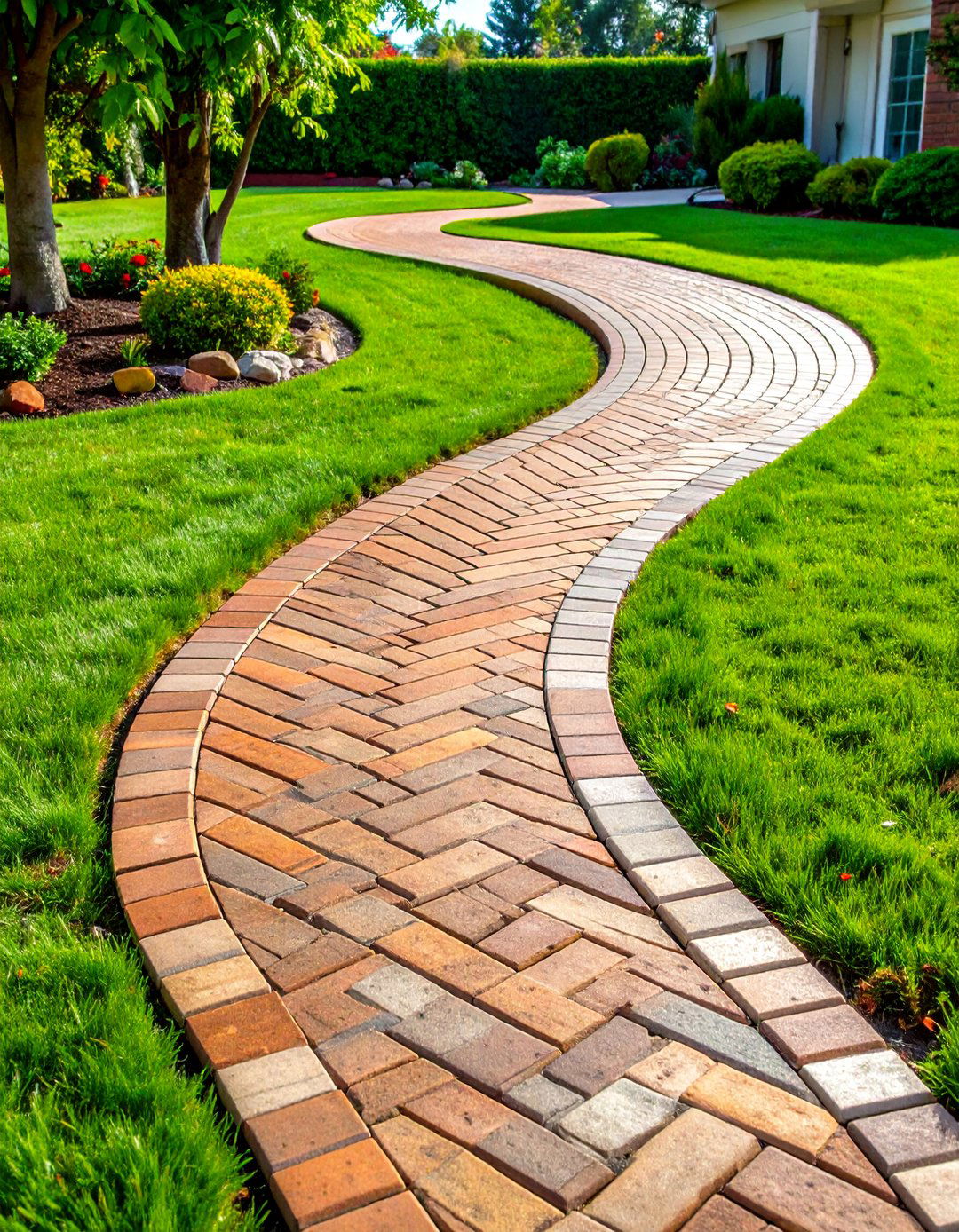
Why settle for ordinary when you can achieve timeless elegance with brick herringbone patterns? This classic design approach uses traditional clay bricks arranged in distinctive V-shaped patterns that follow curved pathways with remarkable grace and stability. The interlocking herringbone pattern provides excellent structural integrity while creating visual interest that draws the eye along the pathway's graceful curves. These walkways complement both traditional and contemporary home styles, offering durability that withstands heavy foot traffic while maintaining their attractive appearance for decades with minimal maintenance requirements.
3. Stamped Concrete Curved Designs
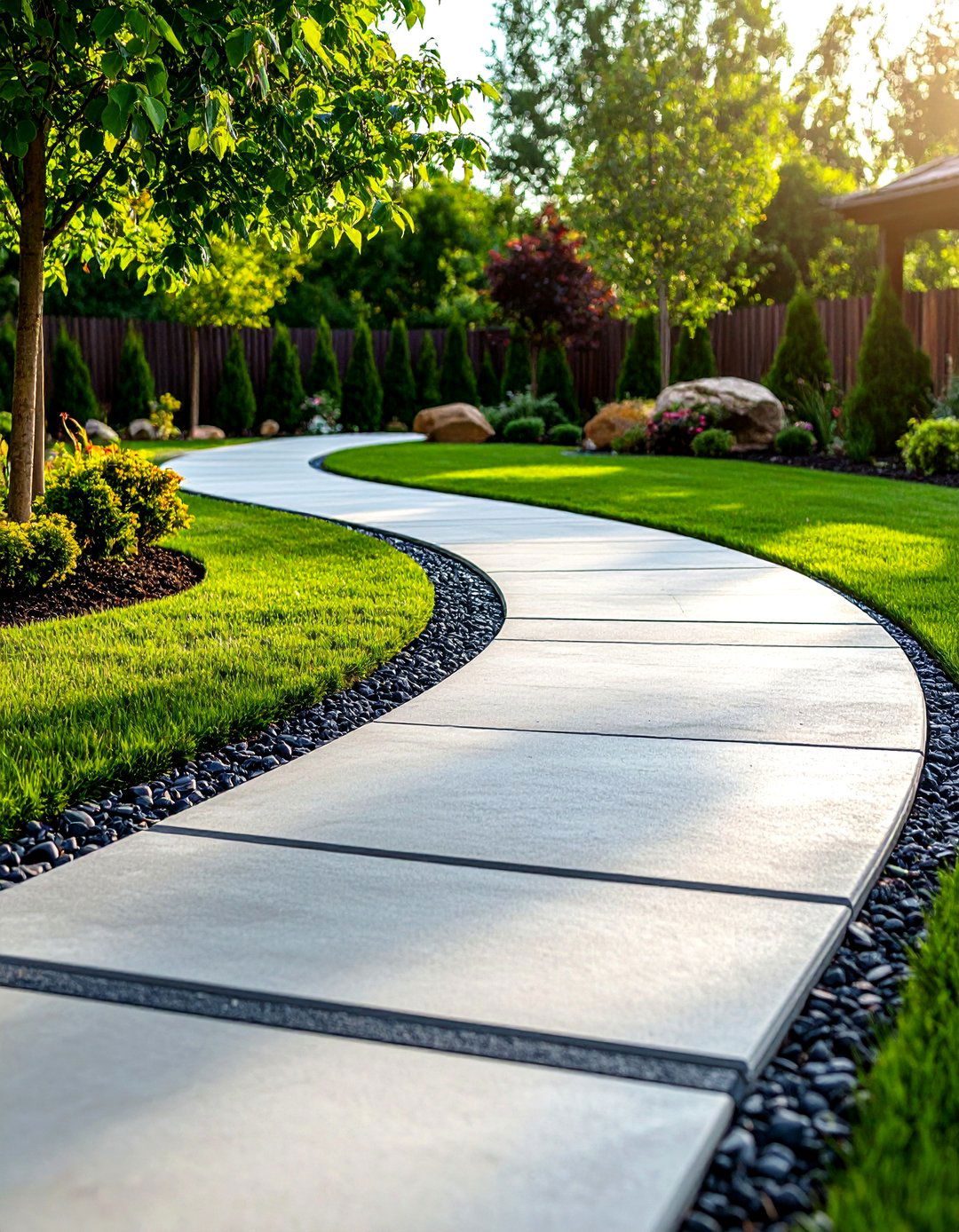
What if you could achieve the look of expensive natural materials at a fraction of the cost? Stamped concrete curved walkways deliver exactly that possibility, using specialized techniques to create realistic textures that mimic stone, brick, or wood while following smooth, flowing curves. These designs offer unlimited customization options through various stamping patterns, color choices, and finishing techniques that can match any architectural style or landscape theme. The versatility of stamped concrete allows for wide, sweeping curves or tight radius turns while maintaining structural integrity and weather resistance.
4. Mixed Material Curved Pathways
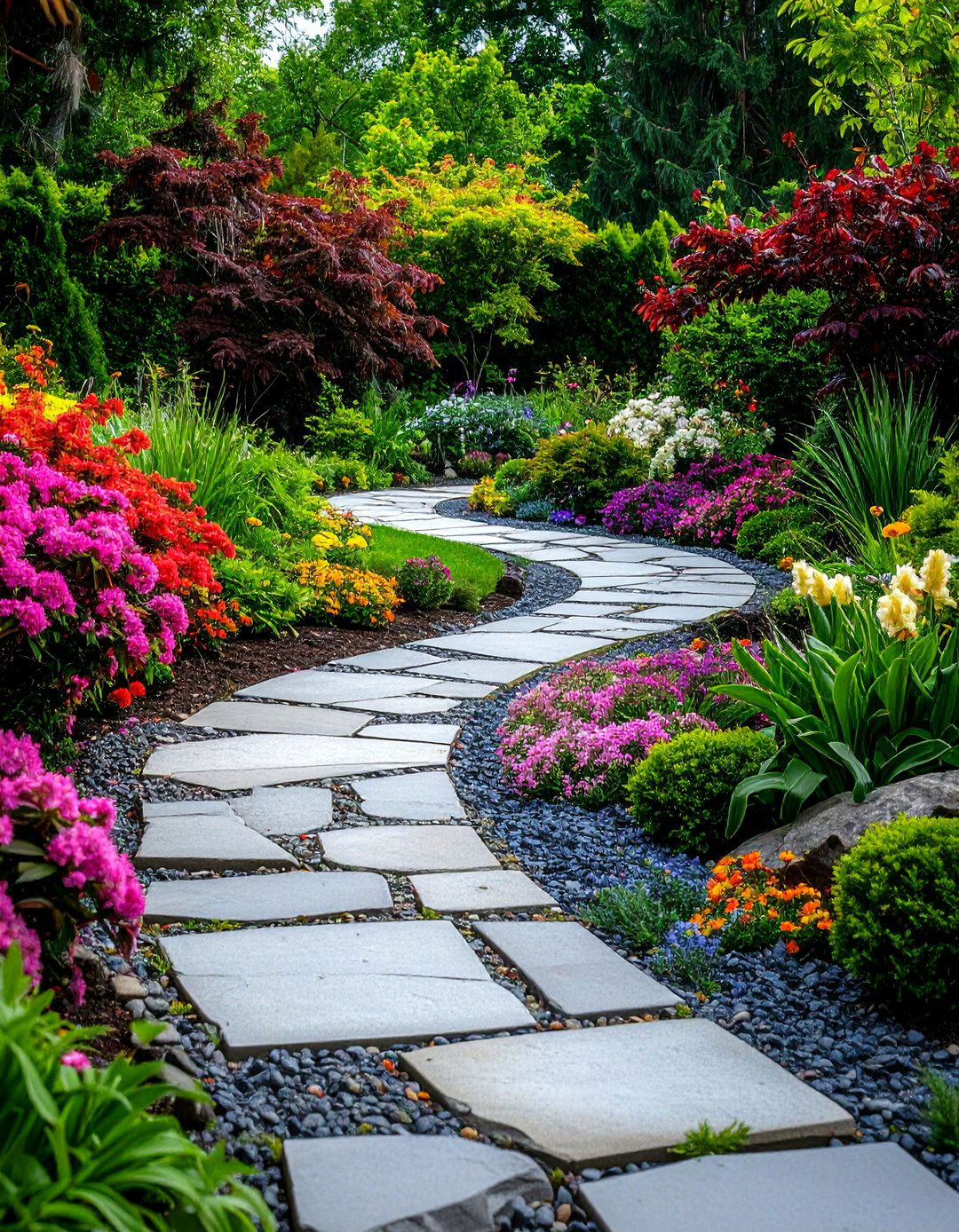
Combining different materials creates dynamic visual interest while maintaining functional pathways that guide visitors through outdoor spaces with style and purpose. These designs typically feature primary pathway materials like concrete pavers or natural stone combined with contrasting elements such as decorative gravel, colored stones, or planted strips that enhance the overall aesthetic appeal. Mixed material approaches allow for creative expression while addressing practical concerns like drainage, cost management, and maintenance requirements that make these walkways both beautiful and sensible long-term investments.
5. Gravel Curved Garden Paths
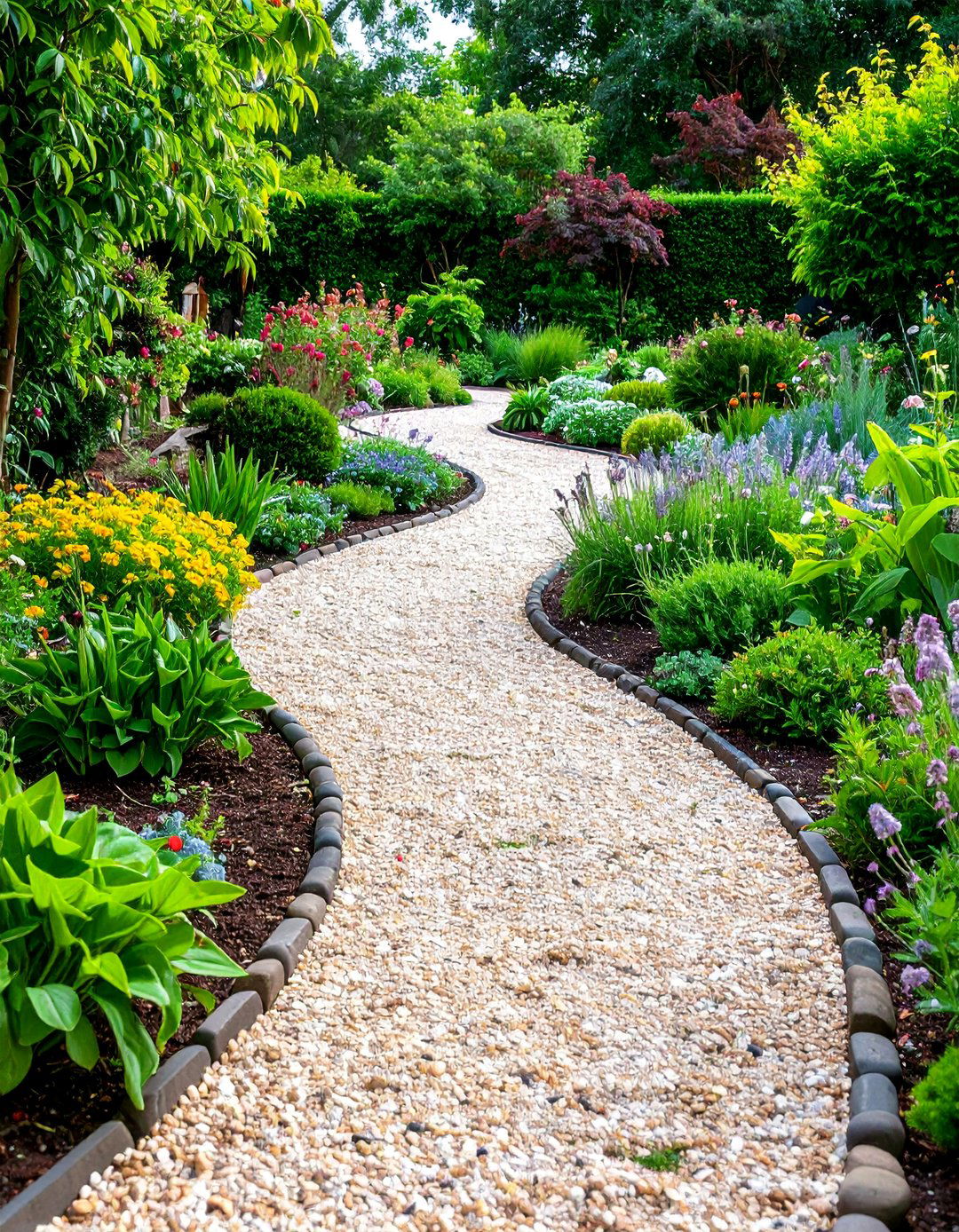
Are you looking for an affordable solution that still delivers stunning results? Gravel curved pathways offer excellent value while creating informal, cottage-style routes that complement natural garden settings perfectly. These designs use various gravel types, from fine pea gravel to larger decorative stones, contained within curved edging systems that maintain pathway definition while allowing for easy installation and modification. The permeable nature of gravel paths provides excellent drainage while creating pleasant walking surfaces that adapt easily to landscape changes over time.
6. Stepping Stone Curved Walkways
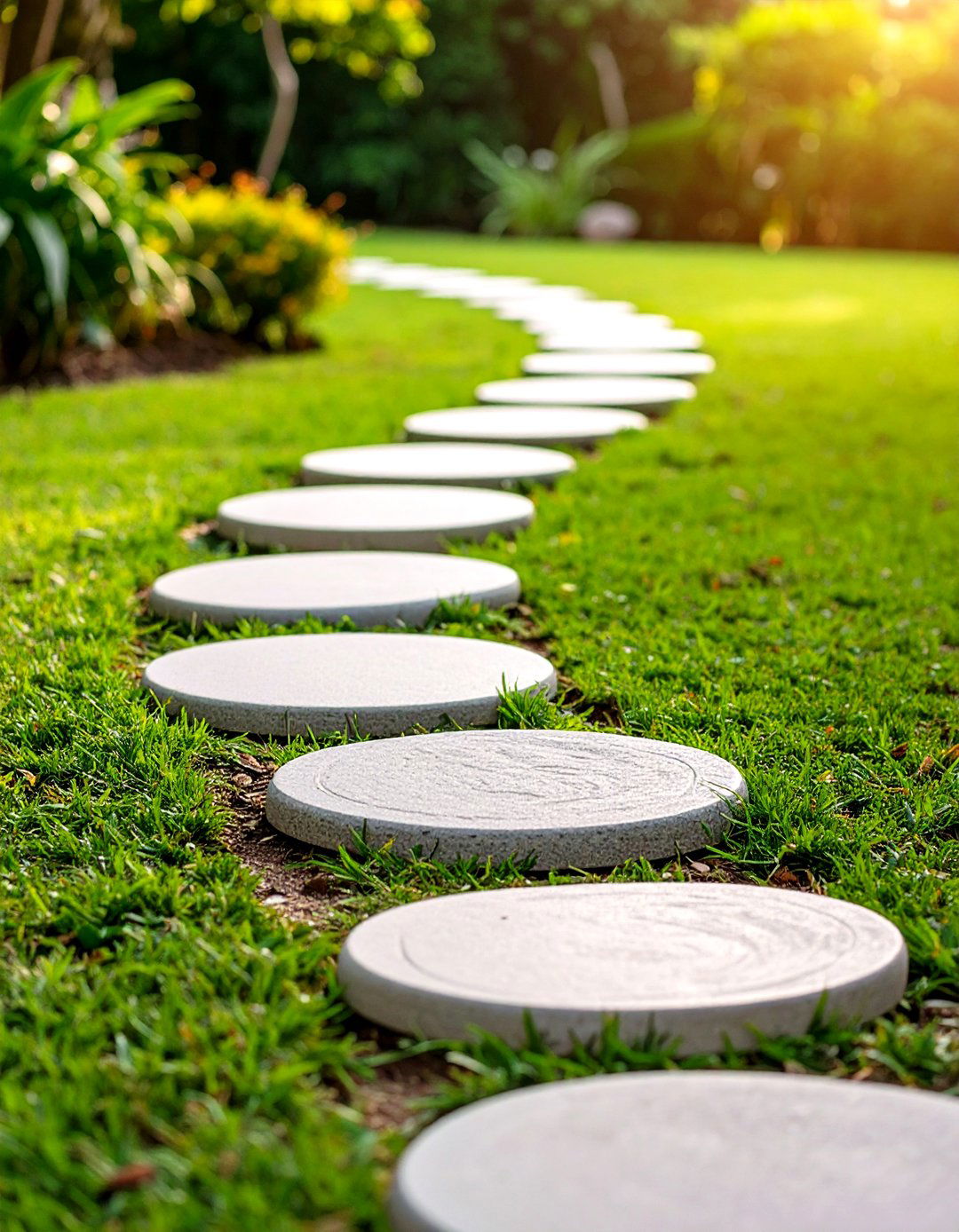
Individual stepping stones create whimsical pathways that encourage leisurely strolls while adding artistic elements to garden landscapes through carefully planned curved arrangements. These designs work particularly well in areas where full pathway coverage isn't necessary, allowing grass or groundcover plants to grow between stones while maintaining clear directional guidance. The spacing and size of stepping stones can be customized to accommodate different users and create various aesthetic effects, from formal geometric arrangements to naturalistic irregular patterns that blend seamlessly with surrounding vegetation and garden features.
7. Permeable Paver Curved Walkways
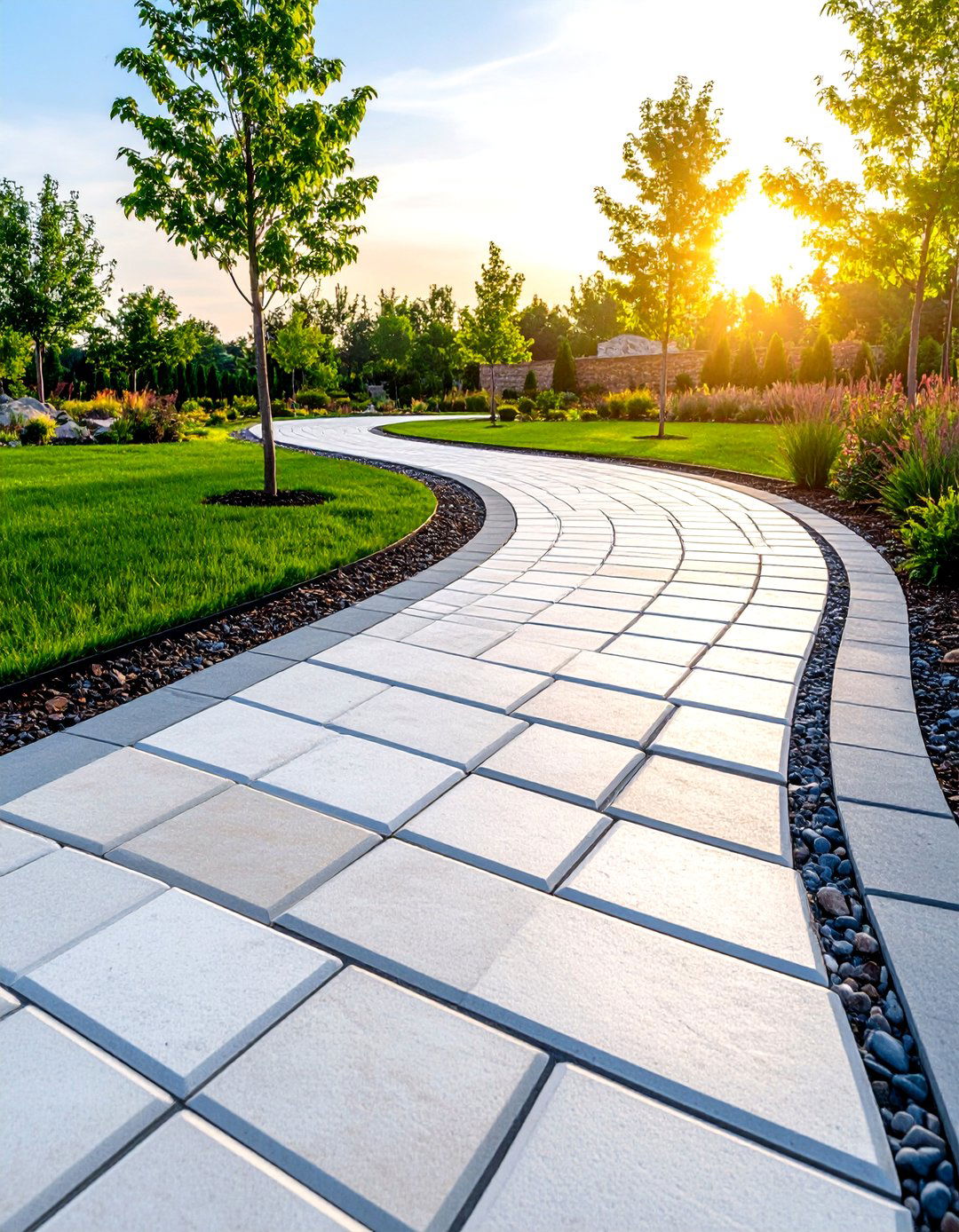
How can you create beautiful pathways while supporting environmental sustainability? Permeable paver curved walkways address both aesthetic and ecological concerns through specialized paving systems that allow water infiltration while maintaining durable, attractive surfaces. These designs use specially manufactured pavers with built-in drainage capabilities or traditional pavers with wider joints filled with permeable materials that reduce stormwater runoff while creating stunning curved pathways. The environmental benefits combine with practical advantages like reduced maintenance and improved longevity to make these walkways excellent choices for eco-conscious homeowners.
8. LED-Lit Curved Pathways
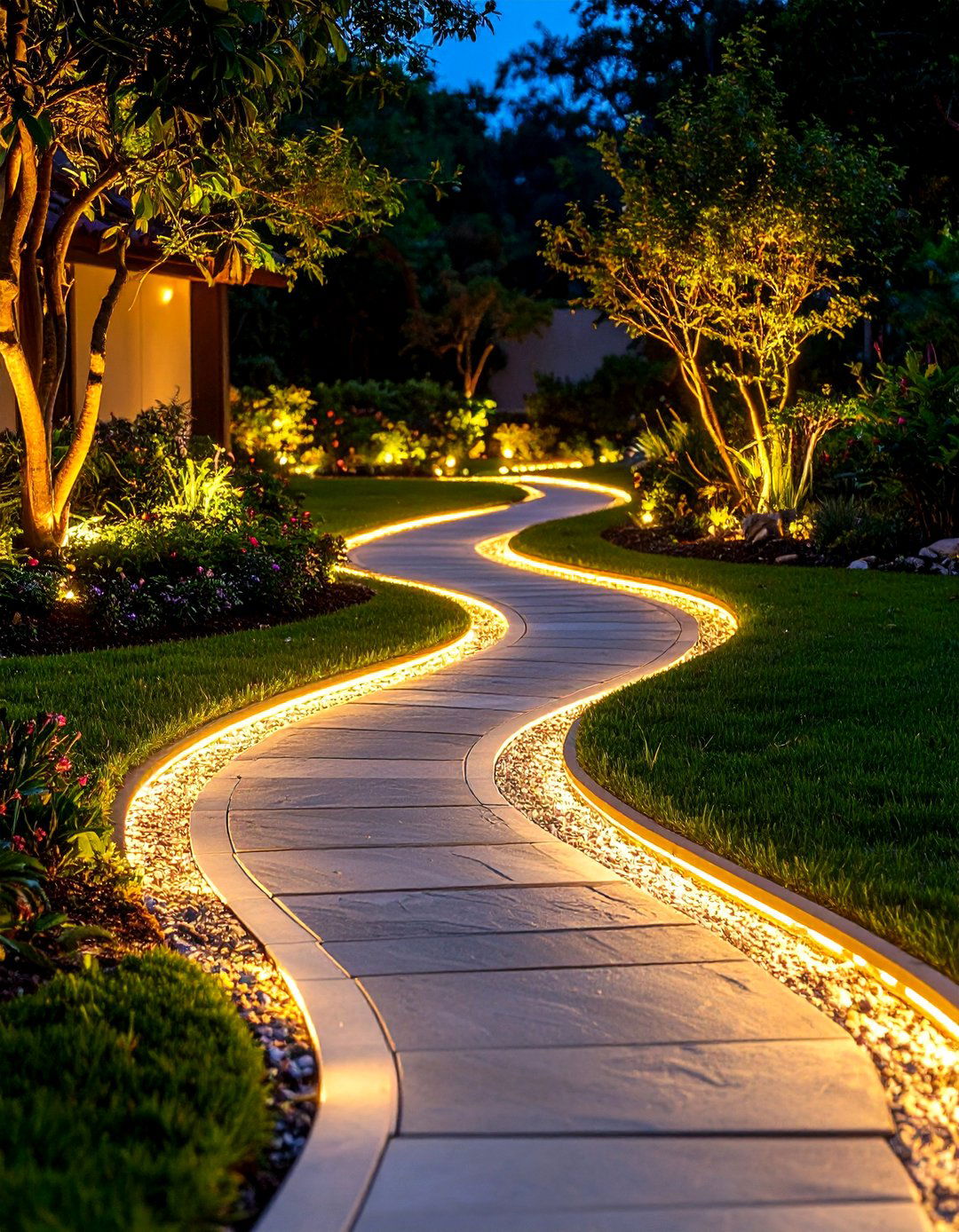
Evening safety and nighttime ambiance merge beautifully in LED-lit curved walkways that transform outdoor spaces into magical environments after dark. These designs incorporate energy-efficient LED lighting systems directly into pathway surfaces or along edges, creating gentle illumination that follows every curve while providing secure footing for nighttime navigation. Smart lighting controls allow for customized brightness levels and timing schedules that enhance both security and entertainment value while minimizing energy consumption and maintenance requirements for year-round outdoor enjoyment.
9. Raised Curved Walkway Systems

Do you want to add dimension and drama to your landscape design? Raised curved walkways create elevated pathways that provide unique perspectives while solving drainage issues and creating defined garden zones. These systems typically use retaining walls or built-up edges to elevate pathway surfaces above surrounding grade levels, allowing for better views of flower beds, water features, and garden sculptures. The elevation changes add visual interest while creating opportunities for terraced plantings and improved accessibility in sloped terrain areas.
10. Mosaic Pattern Curved Walkways

Artistic expression meets functional pathway design in mosaic pattern curved walkways that incorporate colorful tiles, stones, or other decorative elements arranged in intricate patterns. These designs allow for personalized artistic statements while maintaining practical walking surfaces that follow graceful curves through garden spaces. Mosaic elements can range from simple geometric patterns to complex artistic scenes that reflect personal interests, cultural heritage, or natural themes that complement surrounding landscape features and architectural elements throughout the outdoor environment.
11. Wide Curved Entrance Walkways

What creates a more welcoming first impression than a generous curved entrance that gracefully guides visitors to your front door? Wide curved entrance walkways provide spacious, elegant approaches that accommodate multiple users while creating impressive visual impact that enhances curb appeal significantly. These designs typically feature widened sections at both ends with gentle curves that follow natural sight lines and landscape features. The generous proportions allow for enhanced safety during inclement weather while providing opportunities for decorative elements like planted borders, lighting features, and architectural accents.
12. Curved Walkways with Plant Borders
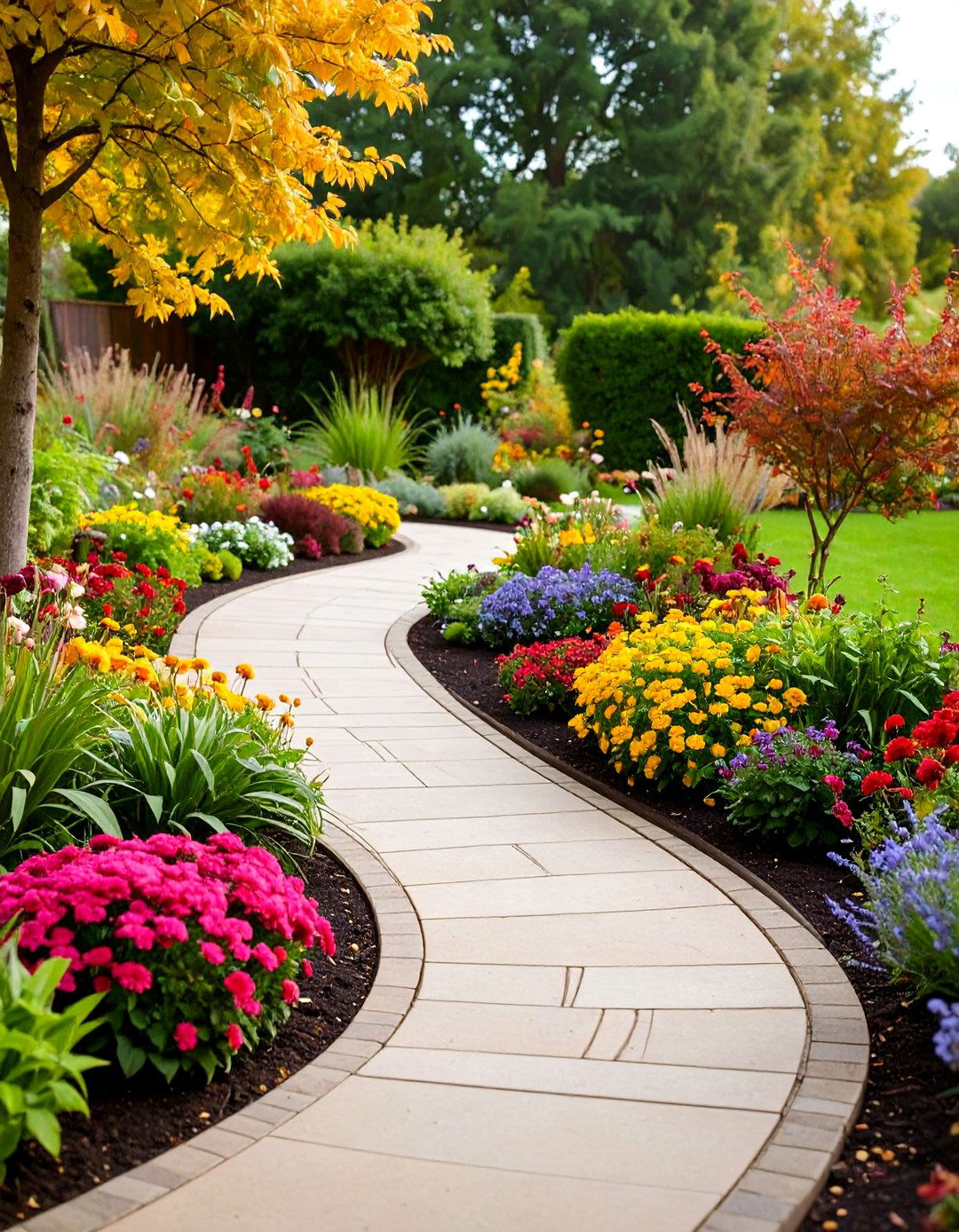
Living borders create stunning frames for curved walkways while providing seasonal interest, fragrance, and habitat benefits that enhance overall garden ecology. These designs incorporate carefully selected perennial plants, ornamental grasses, or flowering shrubs along pathway edges, creating natural transitions between hardscape and landscape elements. Plant selection considers bloom times, mature sizes, and maintenance requirements to ensure year-round visual appeal while providing practical benefits like erosion control and privacy screening that enhance the pathway's functional value.
13. Contemporary Geometric Curved Paths
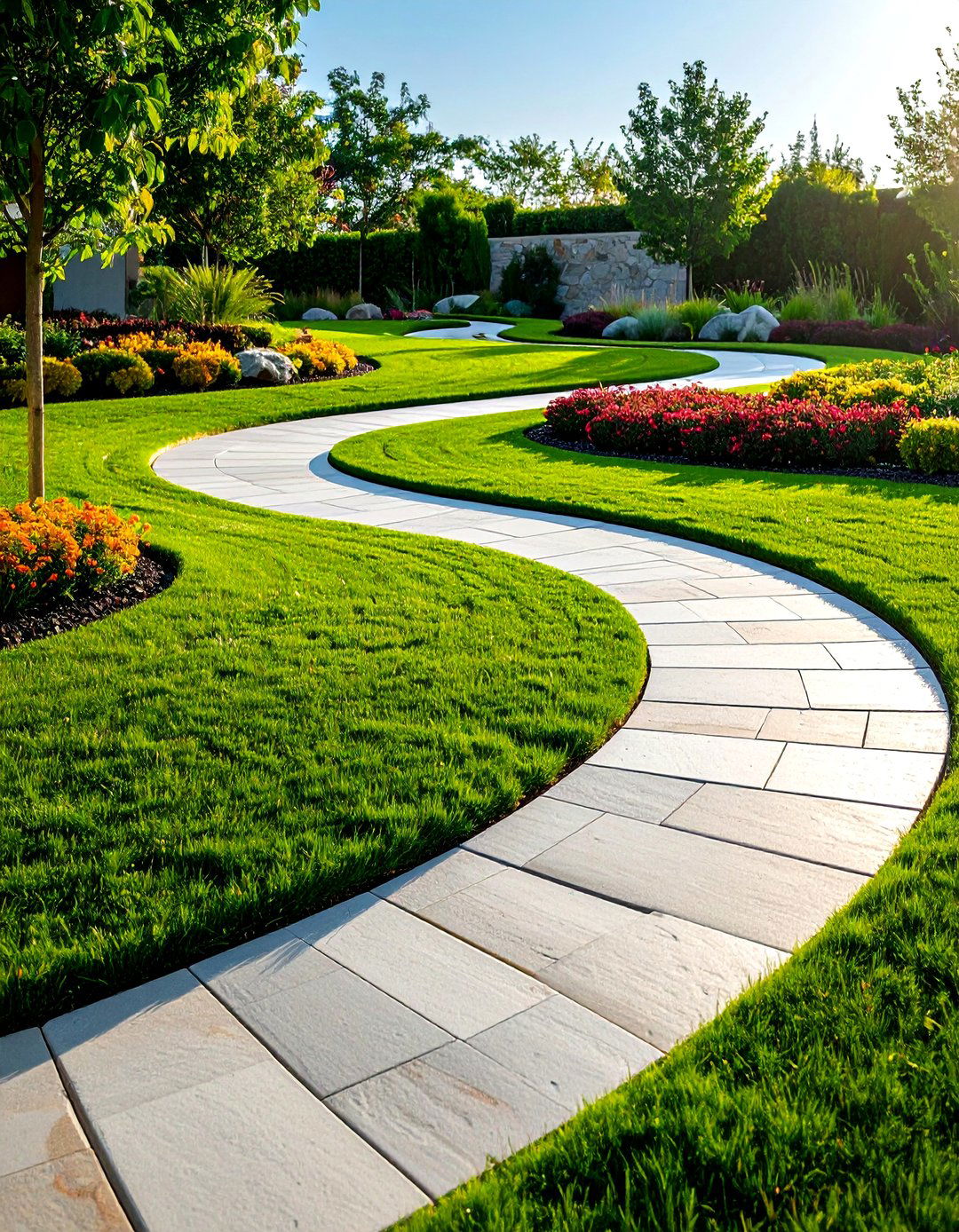
Modern design principles meet curved pathway functionality in contemporary geometric approaches that use clean lines, bold patterns, and minimalist aesthetics. These designs often feature large-format concrete pavers, natural stone slabs, or manufactured materials arranged in geometric patterns that follow curved routes with mathematical precision. The contrast between geometric elements and flowing curves creates dynamic visual tension that complements contemporary architecture while providing sophisticated outdoor circulation systems that reflect current design trends and lifestyle preferences.
14. Curved Pathways Through Water Features

Have you considered how water elements can enhance curved pathway designs? Integration with water features creates sensory-rich experiences that combine the visual appeal of flowing water with the practical functionality of curved walkways. These designs might include pathways that cross streams via stepping stones, curve around pond edges, or incorporate water channels that run parallel to walking surfaces. The combination of water sounds, reflective surfaces, and curved pathway geometry creates peaceful, meditative environments that provide respite from daily stresses while maintaining practical circulation functions.
15. Decomposed Granite Curved Trails
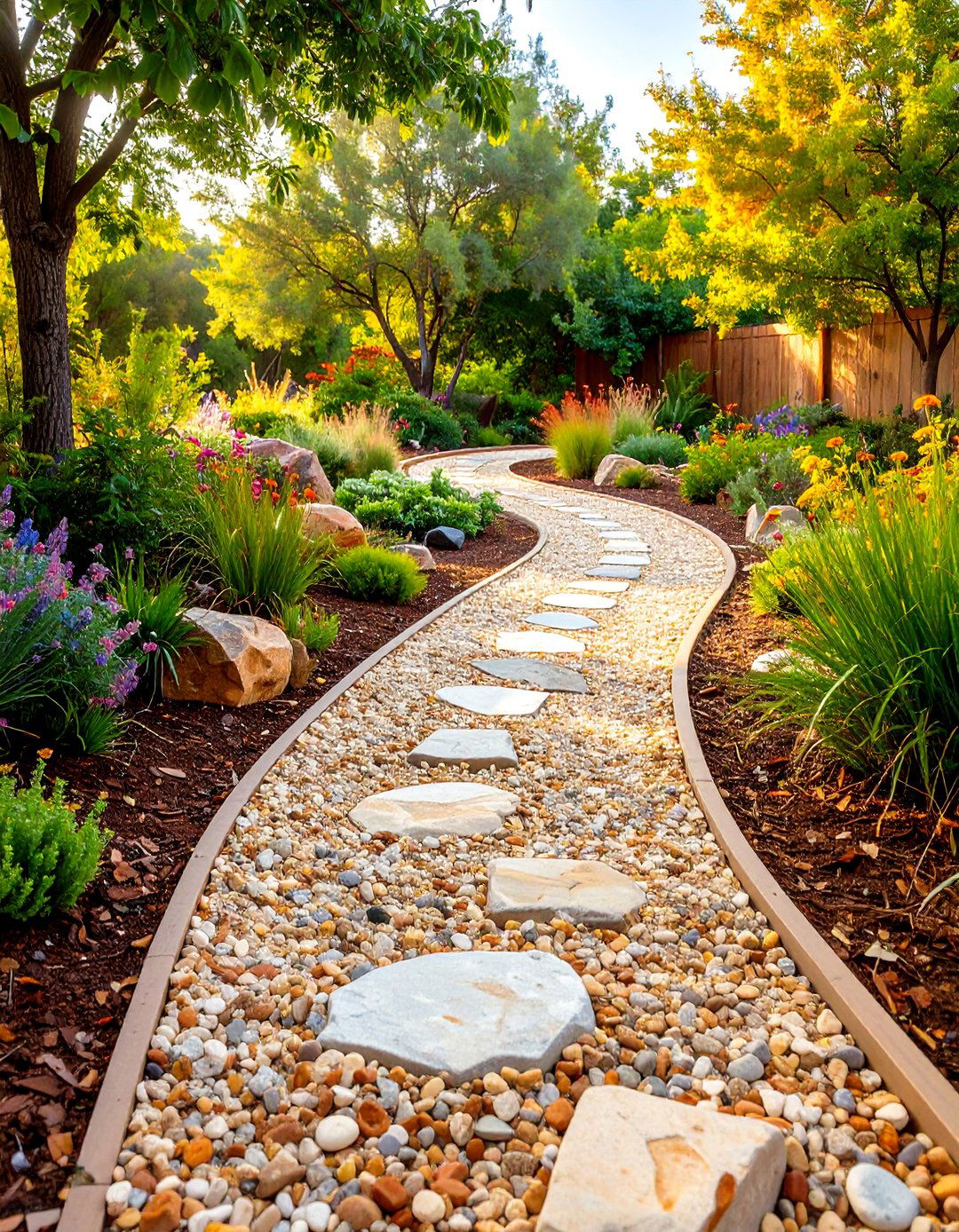
Natural, sustainable pathway materials like decomposed granite create informal curved trails that blend seamlessly with native landscapes while providing firm, stable walking surfaces. These designs work particularly well in drought-tolerant gardens, native plant landscapes, and areas where minimal environmental impact is desired. Decomposed granite compacts naturally to create smooth surfaces while maintaining permeability and requiring minimal maintenance once properly installed. The neutral colors and natural texture complement most plant palettes while providing cost-effective solutions for extensive pathway systems.
16. Curved Boardwalk Pathways

Wooden boardwalks adapt beautifully to curved pathway designs, creating elevated routes that protect sensitive vegetation while providing unique walking experiences above ground level. These systems work particularly well in wetland areas, over uneven terrain, or where minimal site disturbance is important for environmental protection. Modern boardwalk construction uses sustainable lumber or composite materials that provide longevity while following curved routes that enhance rather than dominate natural landscape features. Proper design ensures accessibility while maintaining aesthetic integration with surrounding environments.
17. Flagstone Curved Pathways

Why choose flagstone for curved pathway applications? The irregular shapes and natural edges of flagstone create organic curved pathways that appear to have evolved naturally within landscape settings. These designs work particularly well with informal garden styles, native plant landscapes, and areas where naturalistic aesthetics are desired. Flagstone's varied colors, textures, and sizes allow for creative arrangements that follow curved routes while providing durable, weather-resistant surfaces that improve with age and develop attractive patina over time through exposure to natural elements.
18. Curved Pathways with Retaining Walls
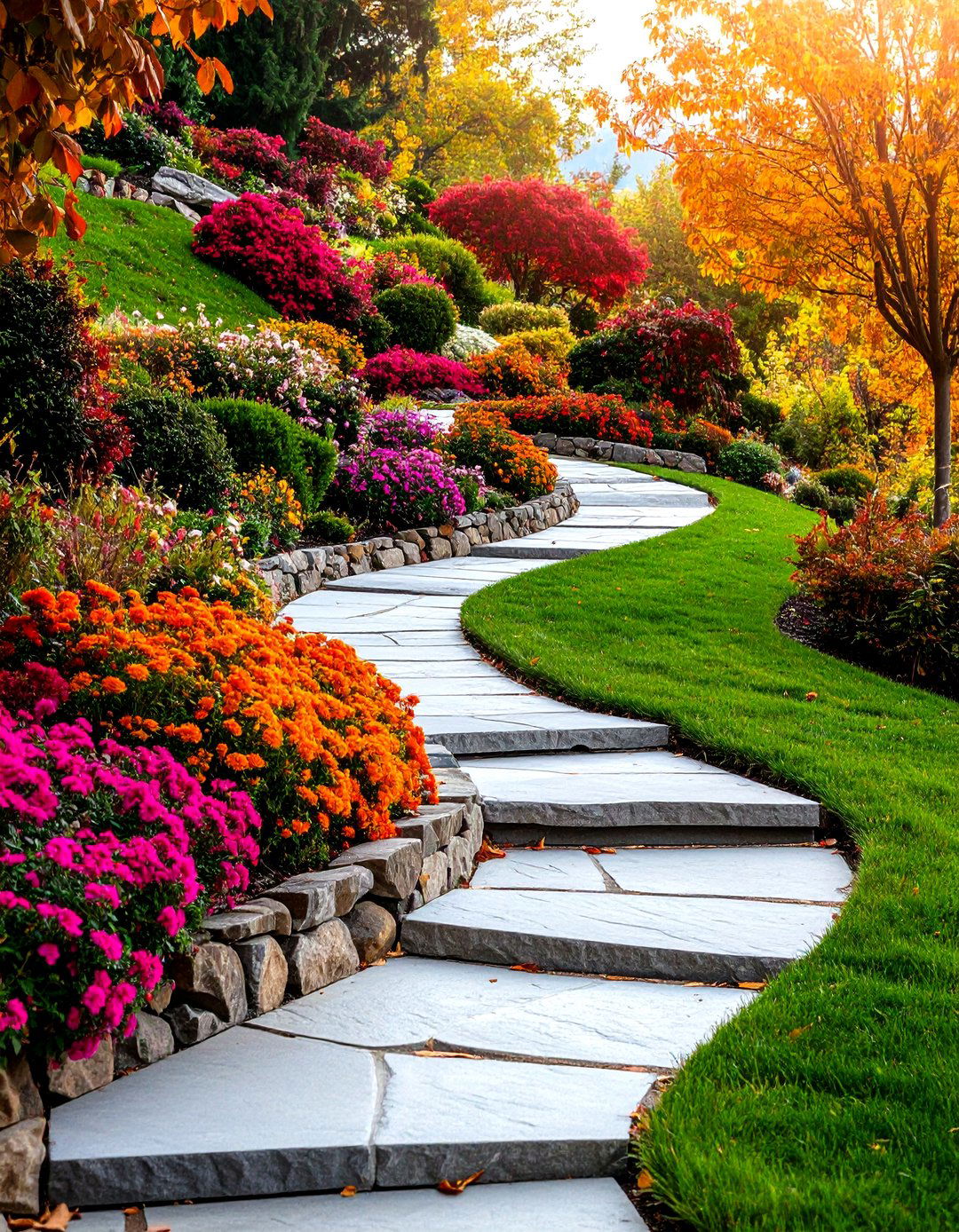
Integration with retaining wall systems creates opportunities for dramatic curved pathways that address slope management while adding architectural interest to landscape designs. These approaches combine curved pathway geometry with structural elements that provide soil retention, create planting opportunities, and define outdoor space boundaries. Retaining wall materials can range from natural stone to manufactured blocks, chosen to complement pathway materials while providing necessary structural support. The combination creates multi-level landscape features that maximize usable space while providing attractive circulation routes.
19. Solar-Lit Curved Garden Paths
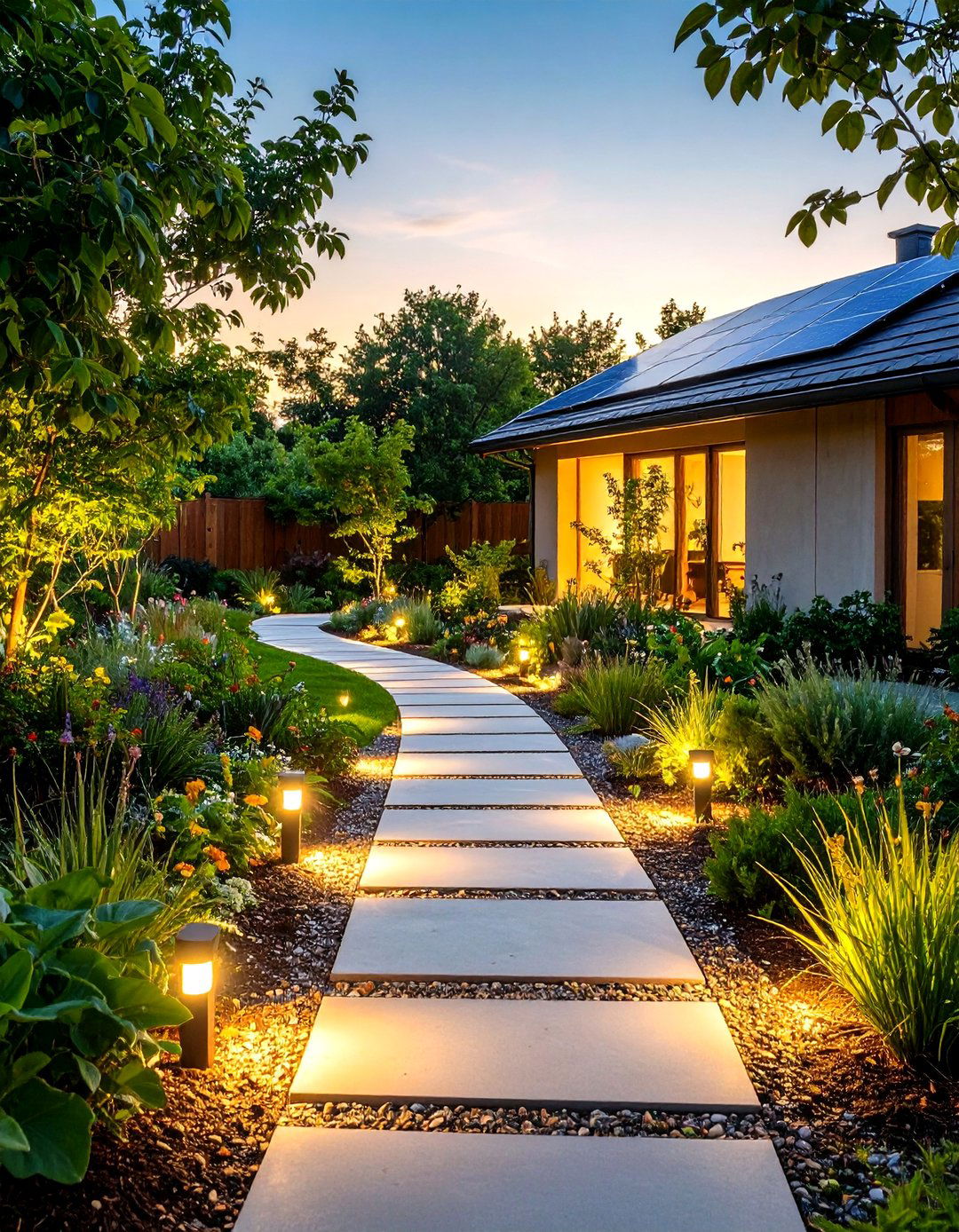
Sustainable lighting solutions enhance curved pathway safety and beauty through solar-powered systems that operate independently of electrical infrastructure while providing reliable nighttime illumination. These designs incorporate solar fixtures strategically placed along curved routes, creating gentle lighting that follows pathway geometry while highlighting landscape features. Modern solar technology provides consistent performance with minimal maintenance requirements, making these systems practical choices for remote locations or areas where electrical installation would be complex or expensive to implement and maintain.
20. Curved Pathways with Drainage Solutions
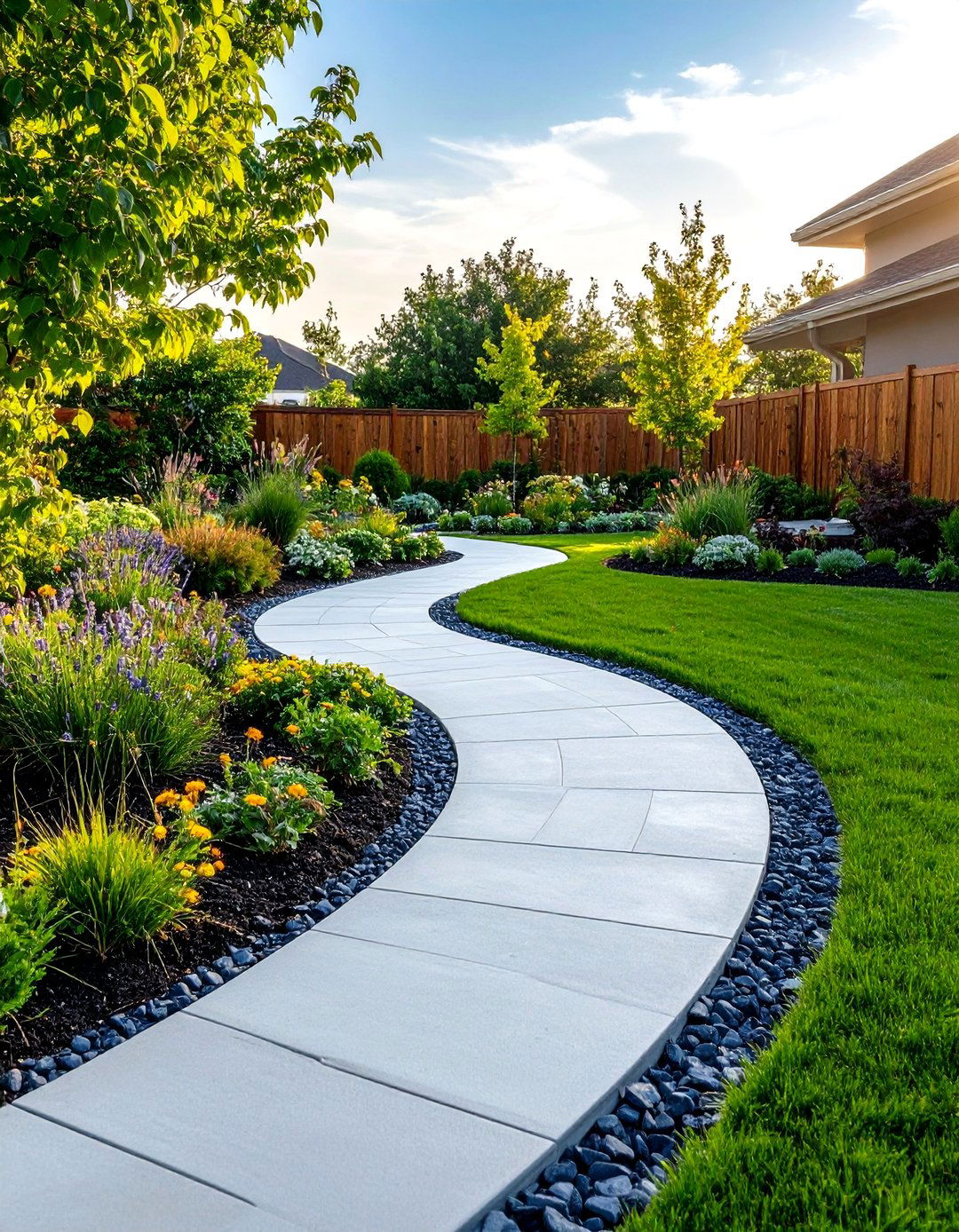
How do you ensure curved pathways remain functional during wet weather? Proper drainage integration prevents water accumulation while maintaining pathway integrity through all weather conditions. These designs incorporate drainage channels, permeable materials, or grading techniques that direct water flow away from walking surfaces while maintaining pathway stability. French drains, permeable joints, or integrated channel systems can be designed to follow curved pathway geometry while providing effective water management that protects both pathway materials and surrounding landscape features from erosion or water damage.
21. Patterned Concrete Curved Walkways
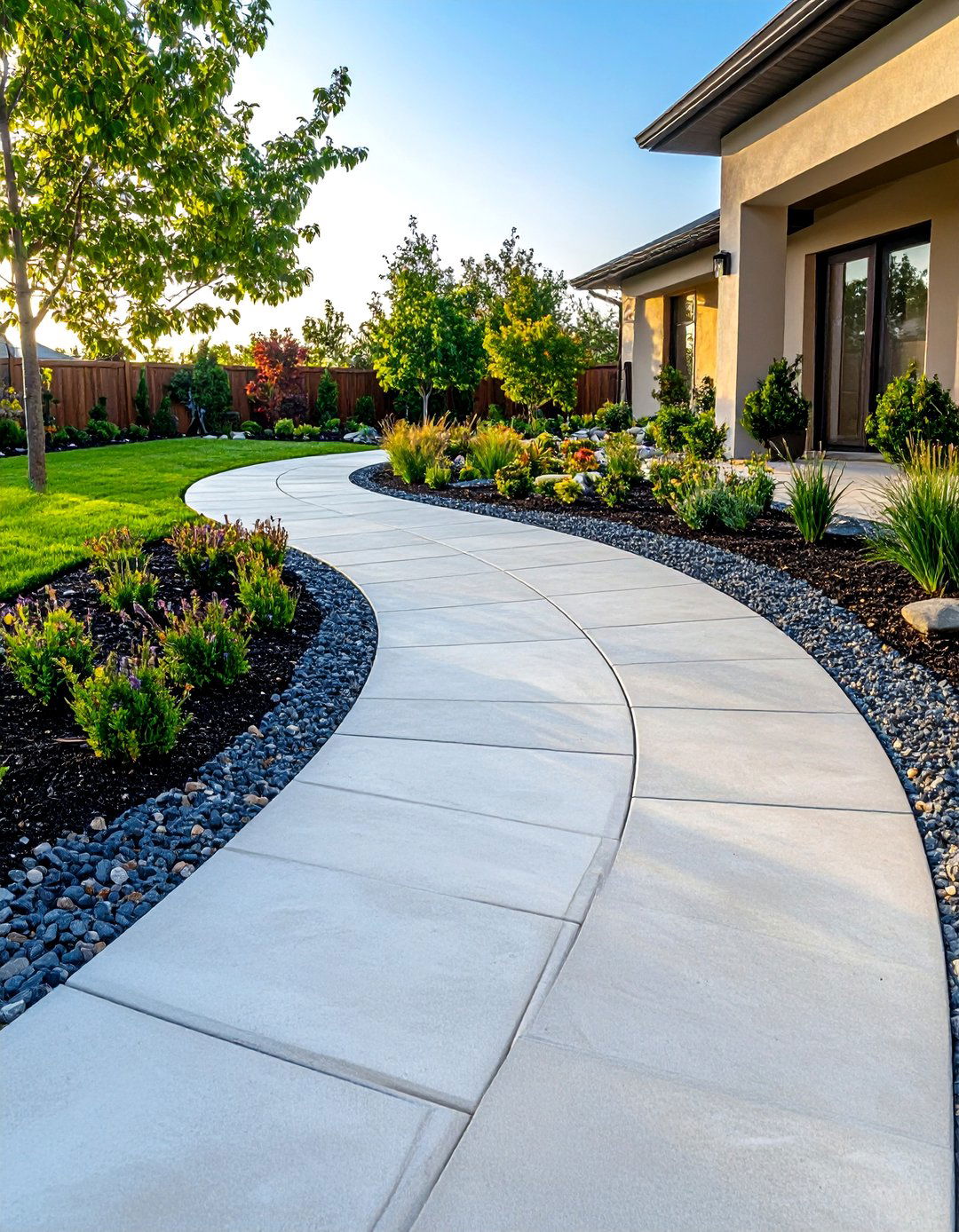
Decorative concrete techniques create stunning curved pathways through saw-cut patterns, exposed aggregate finishes, or colored concrete applications that provide visual interest while maintaining durability. These approaches offer extensive customization possibilities through pattern selection, color choices, and finishing techniques that can complement any architectural style or landscape theme. Saw-cut patterns can follow curved geometry while creating geometric interest, while exposed aggregate provides textural variety and slip resistance. Colored concrete allows for unlimited aesthetic possibilities while maintaining practical performance characteristics.
22. Curved Pathways for Accessibility
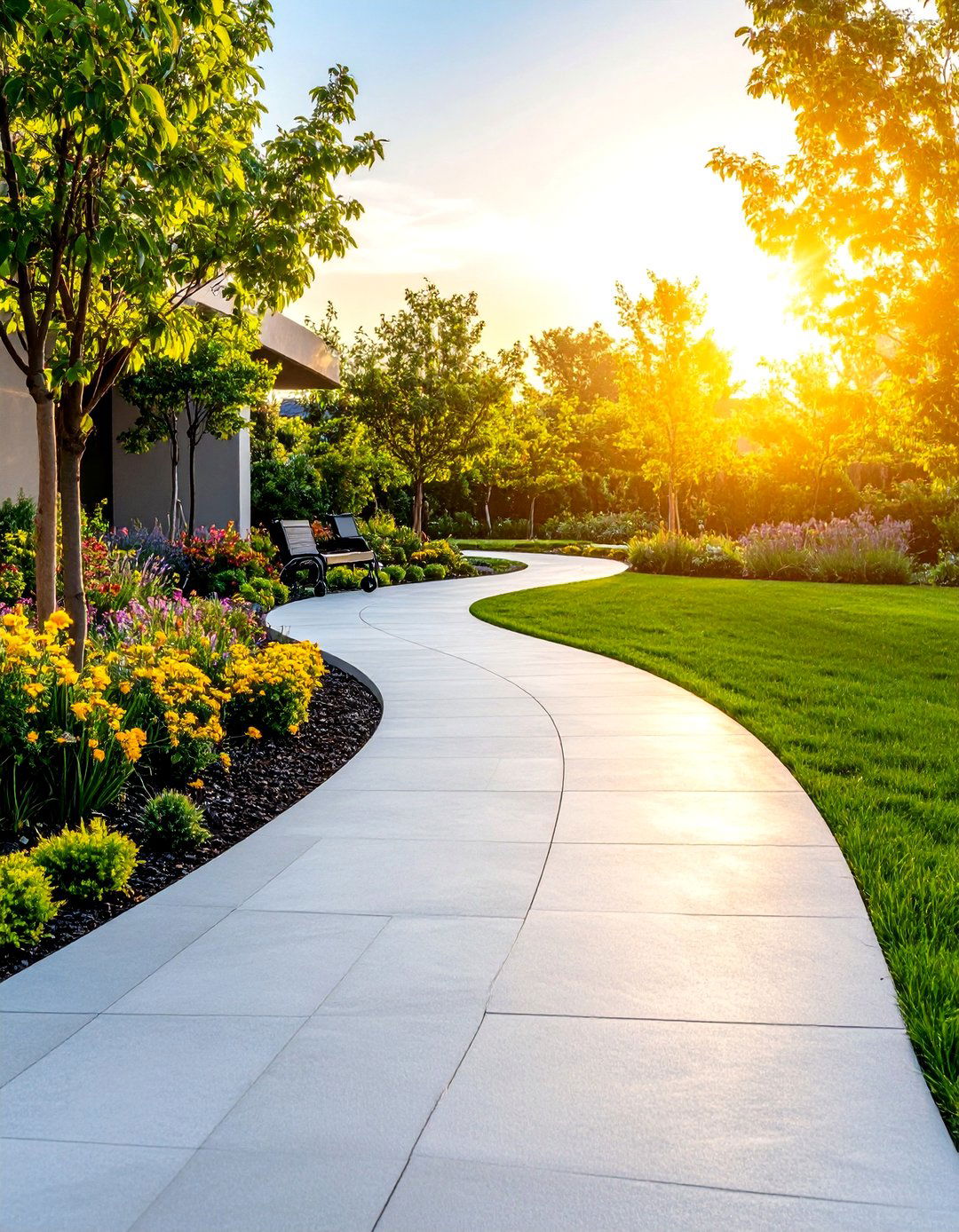
Universal design principles ensure curved pathways accommodate all users while maintaining aesthetic appeal and landscape integration. These designs consider slope gradients, pathway widths, surface materials, and turning radii that meet accessibility guidelines while providing beautiful curved routes through outdoor spaces. Proper planning ensures comfortable navigation for wheelchair users, individuals with mobility challenges, and aging-in-place considerations while maintaining visual appeal. Surface materials, edge treatments, and lighting systems are selected to provide safety and usability for all users regardless of physical capabilities.
23. Seasonal Interest Curved Walkways

What makes a curved pathway beautiful throughout changing seasons? Thoughtful plant selection and material choices ensure year-round visual appeal while providing seasonal variety that keeps pathway experiences fresh and engaging. These designs incorporate plants with different bloom times, foliage colors, and winter interest while selecting pathway materials that look attractive in all weather conditions. Seasonal container plantings, holiday decorations, and changeable elements allow for customization throughout the year while maintaining consistent pathway functionality and basic aesthetic appeal.
24. Curved Maintenance Pathways
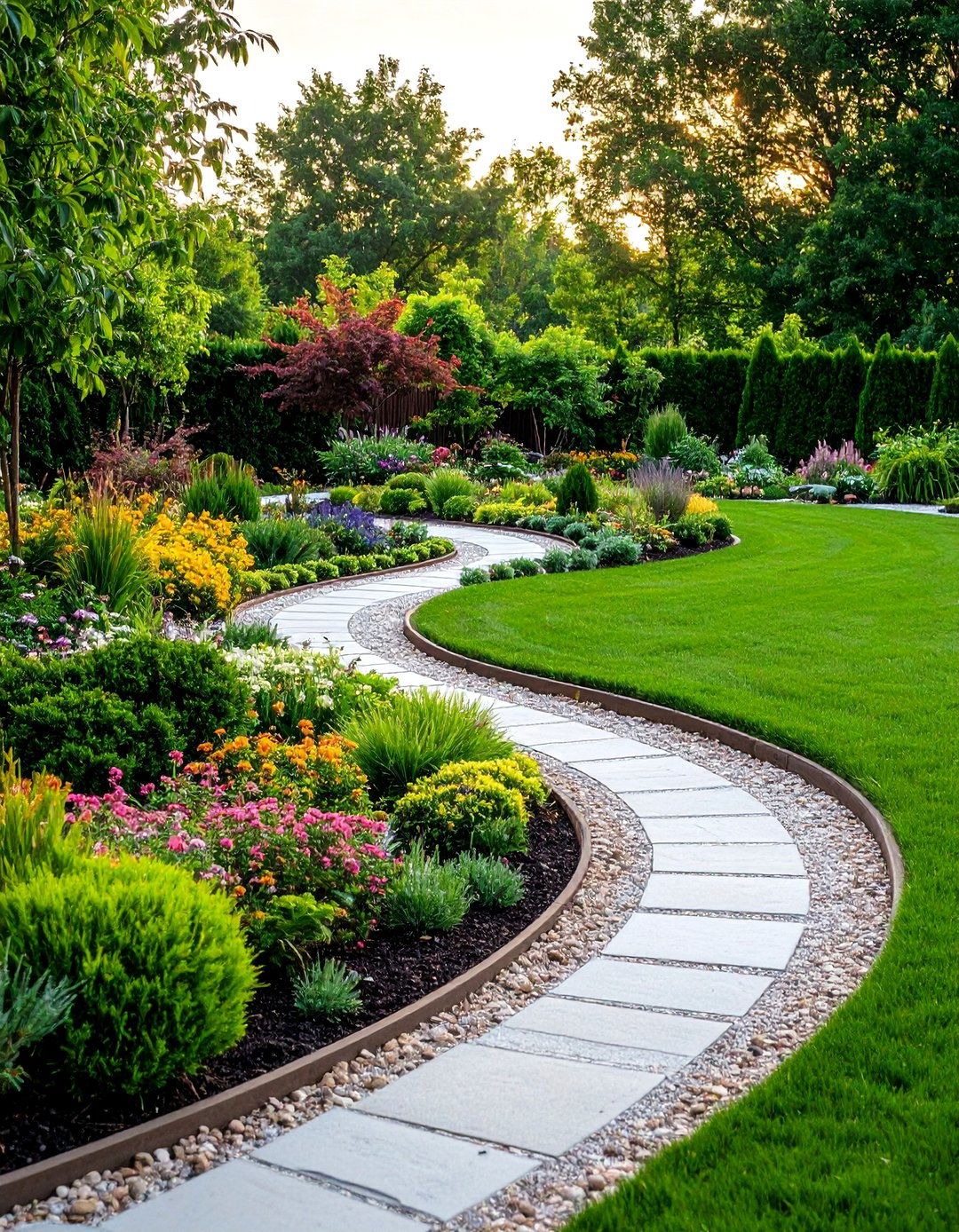
Behind-the-scenes curved pathways provide essential access for garden maintenance while remaining aesthetically pleasing when viewed from main landscape areas. These designs balance practical requirements like equipment access, utility line accommodation, and service needs with visual considerations that ensure pathways enhance rather than detract from overall landscape design. Material selection emphasizes durability and ease of maintenance while pathway routing considers both functional efficiency and visual discretion. Proper planning ensures these pathways integrate seamlessly with overall landscape design while providing necessary utility access.
Conclusion:
Curved walkways represent more than simple circulation routes; they create opportunities for artistic expression, environmental stewardship, and enhanced outdoor living experiences that benefit both property owners and visitors. These twenty-four design approaches demonstrate the incredible versatility available through curved pathway design, from natural stone arrangements that blend seamlessly with existing landscapes to contemporary geometric patterns that make bold architectural statements. Each approach offers unique advantages while addressing practical concerns like accessibility, drainage, lighting, and maintenance requirements that ensure long-term success and satisfaction with pathway investments throughout changing seasons and evolving landscape needs.


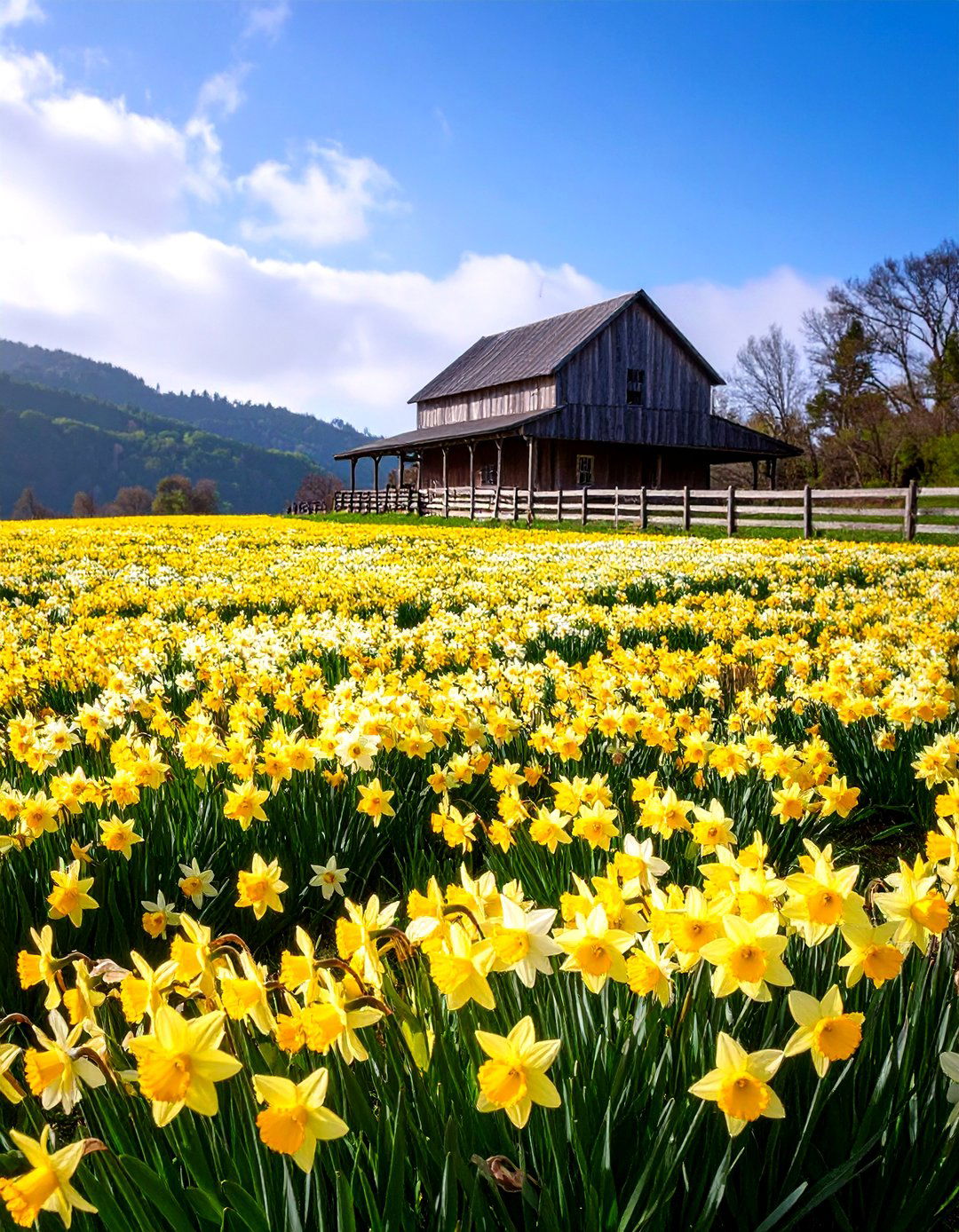
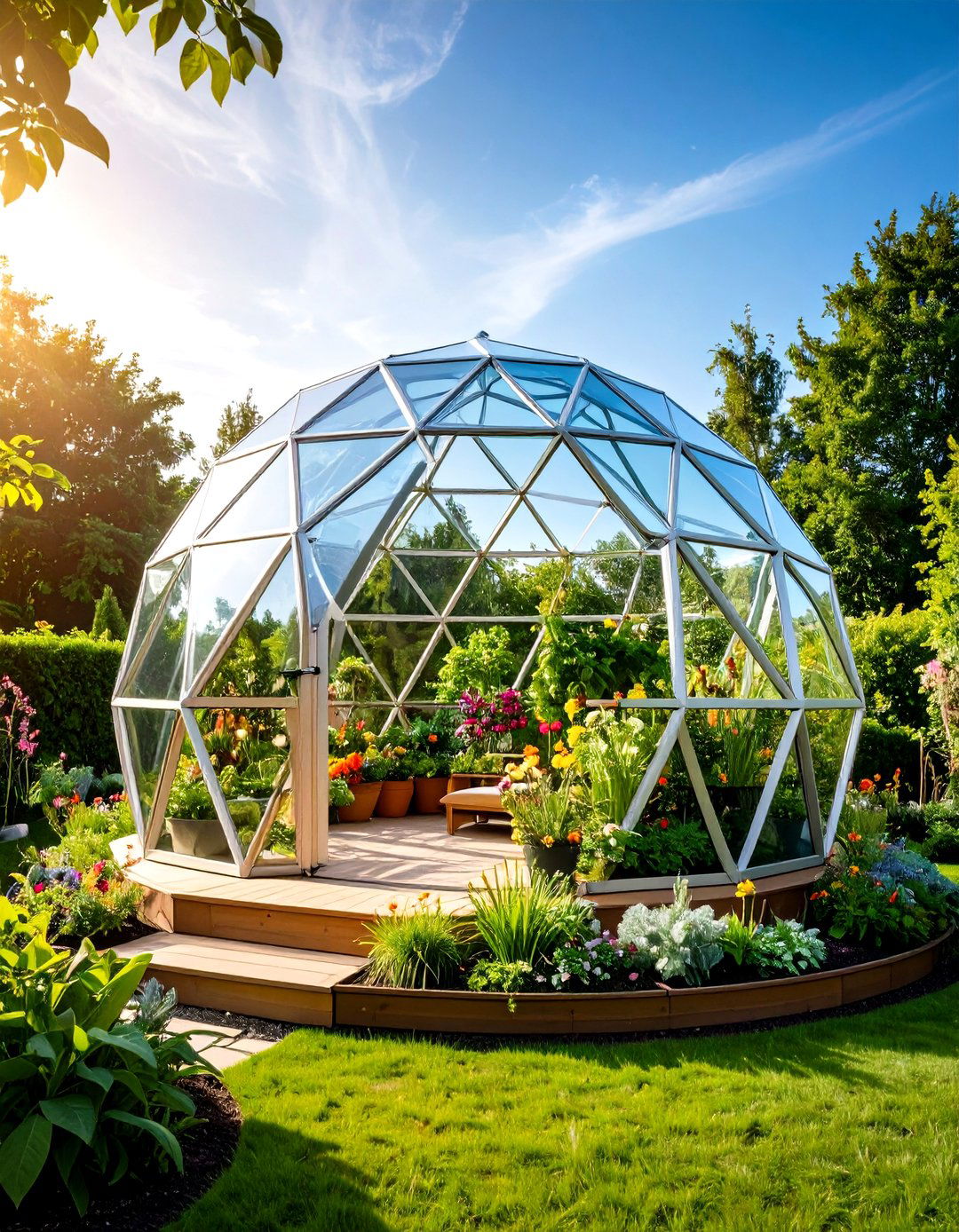


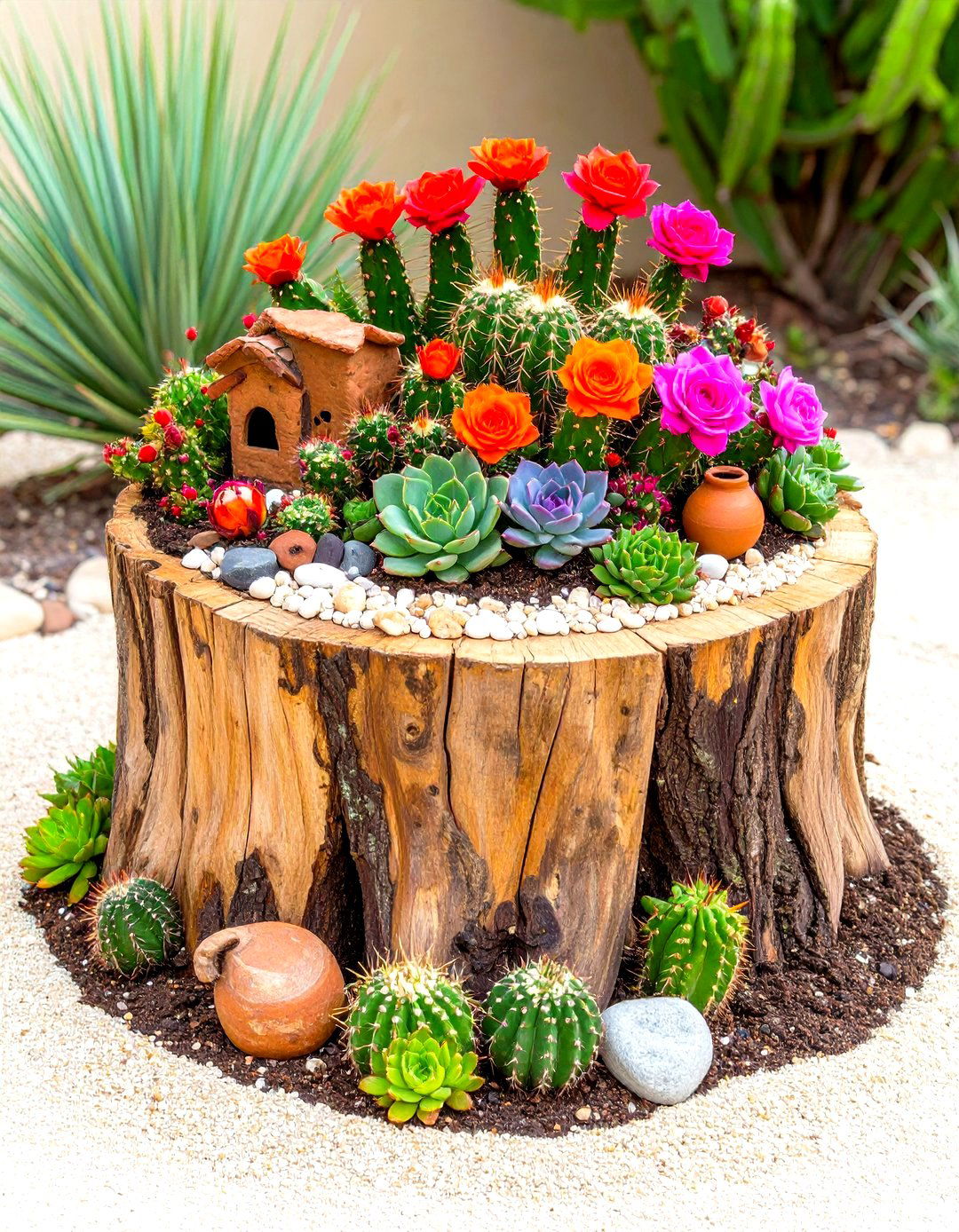
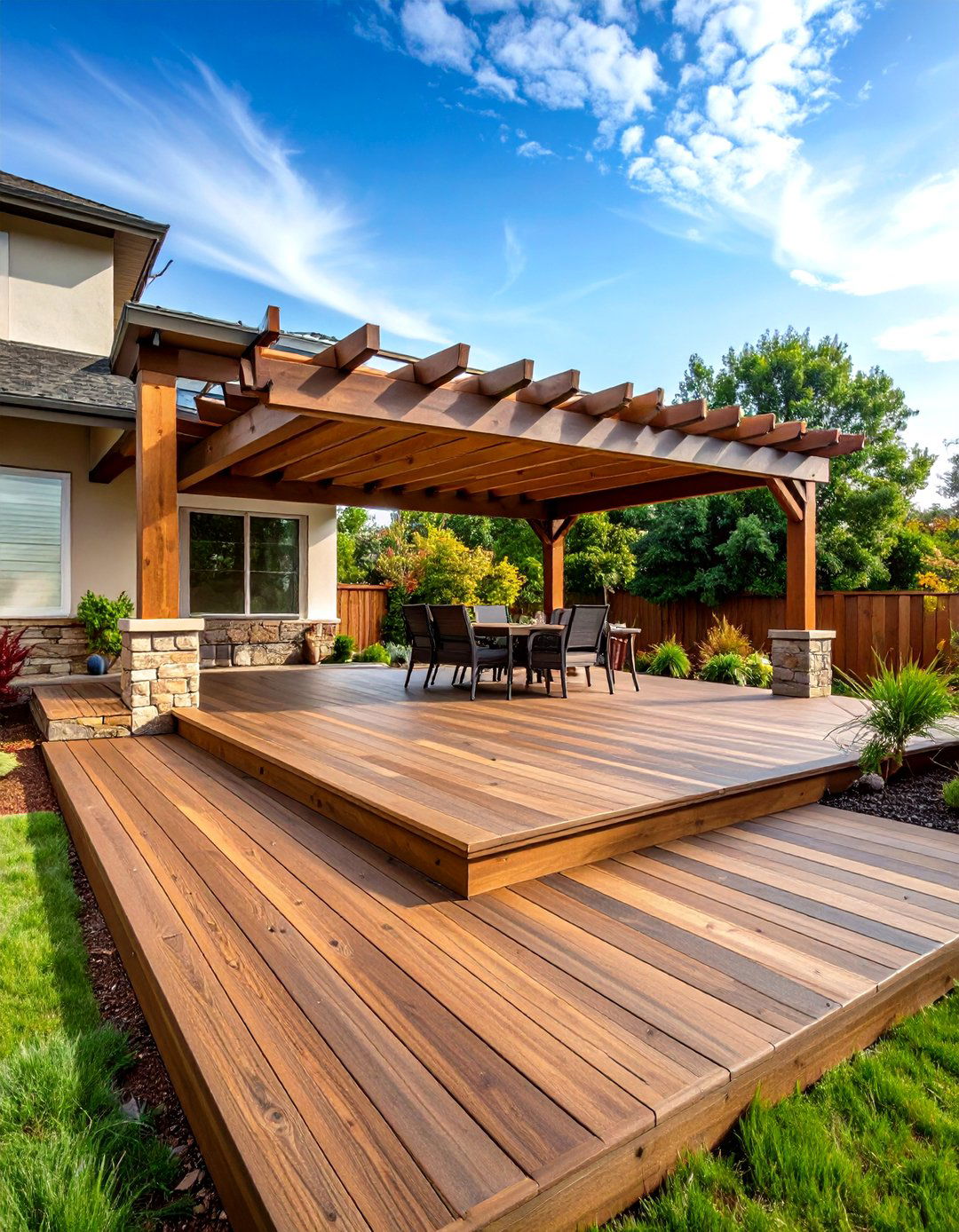



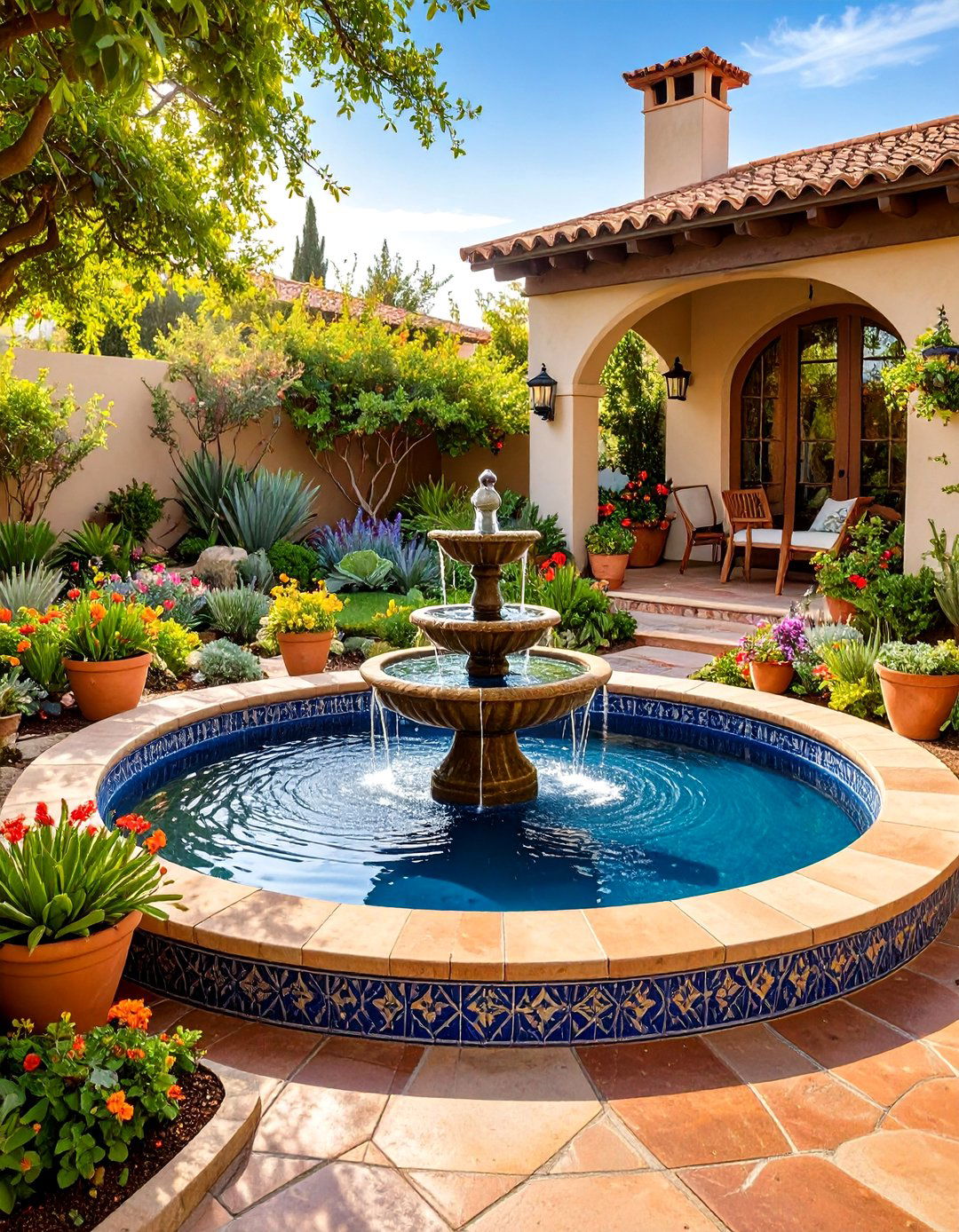
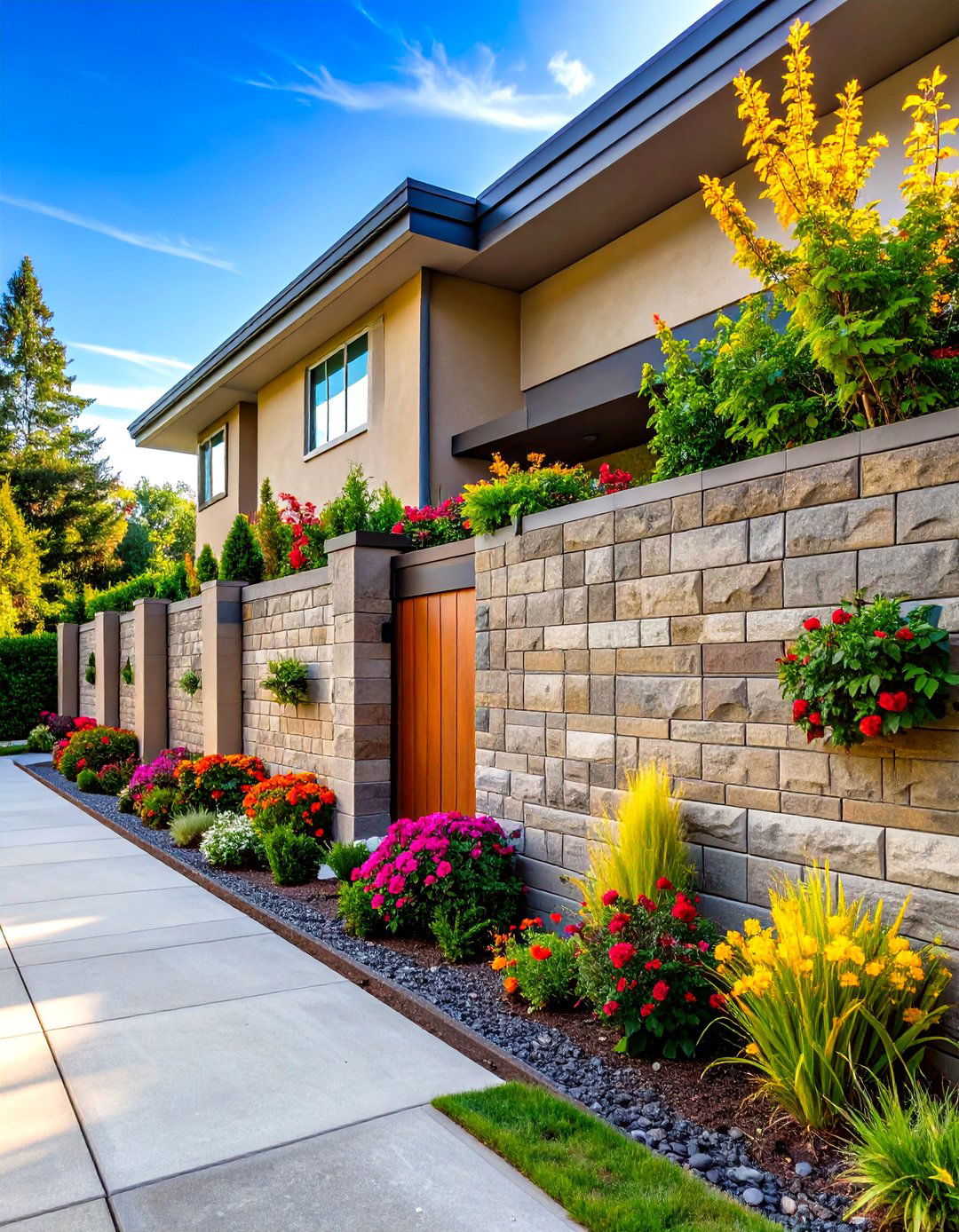
Leave a Reply